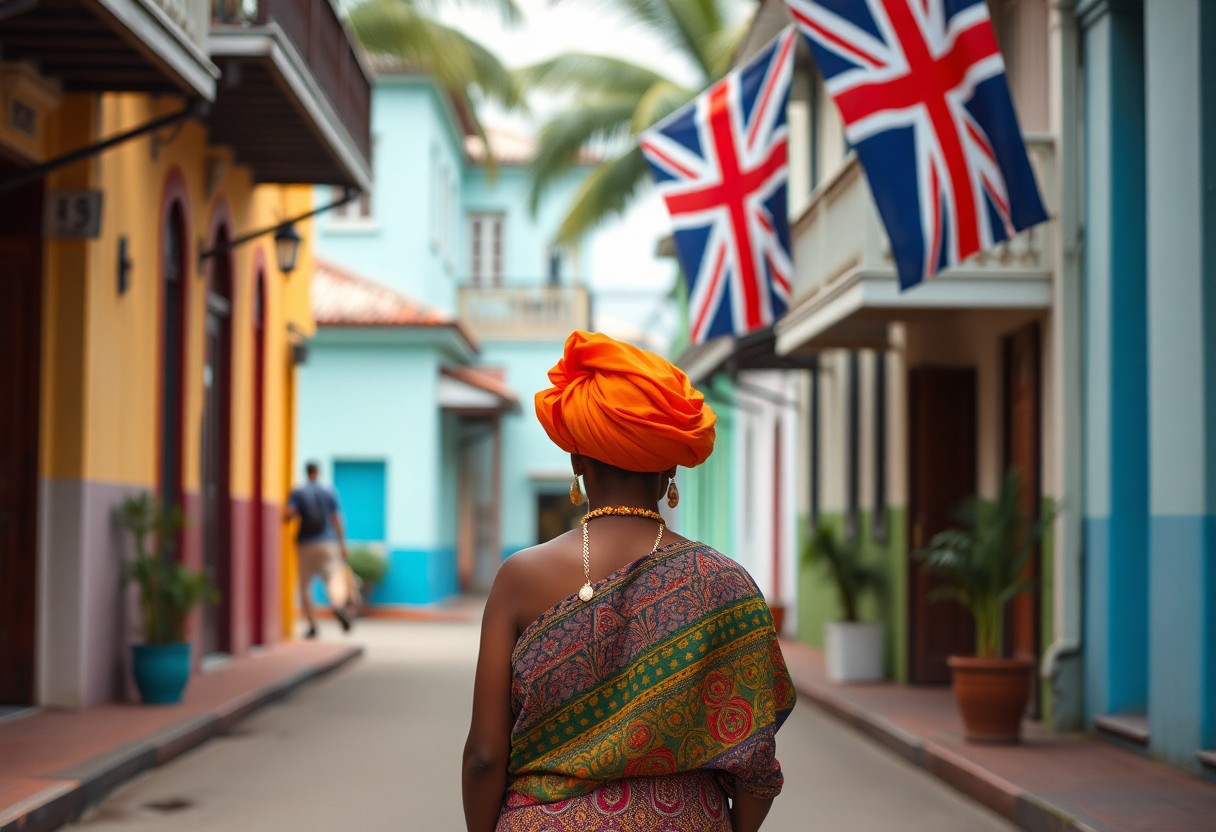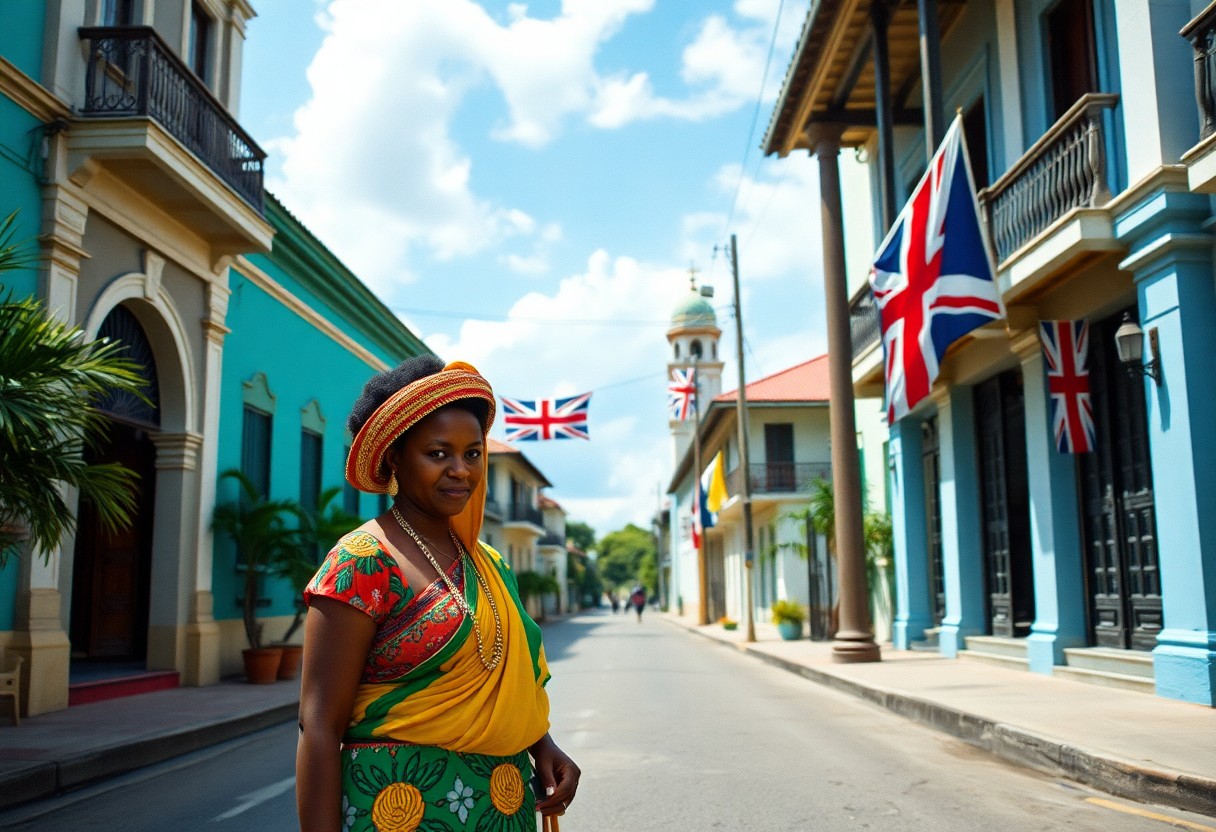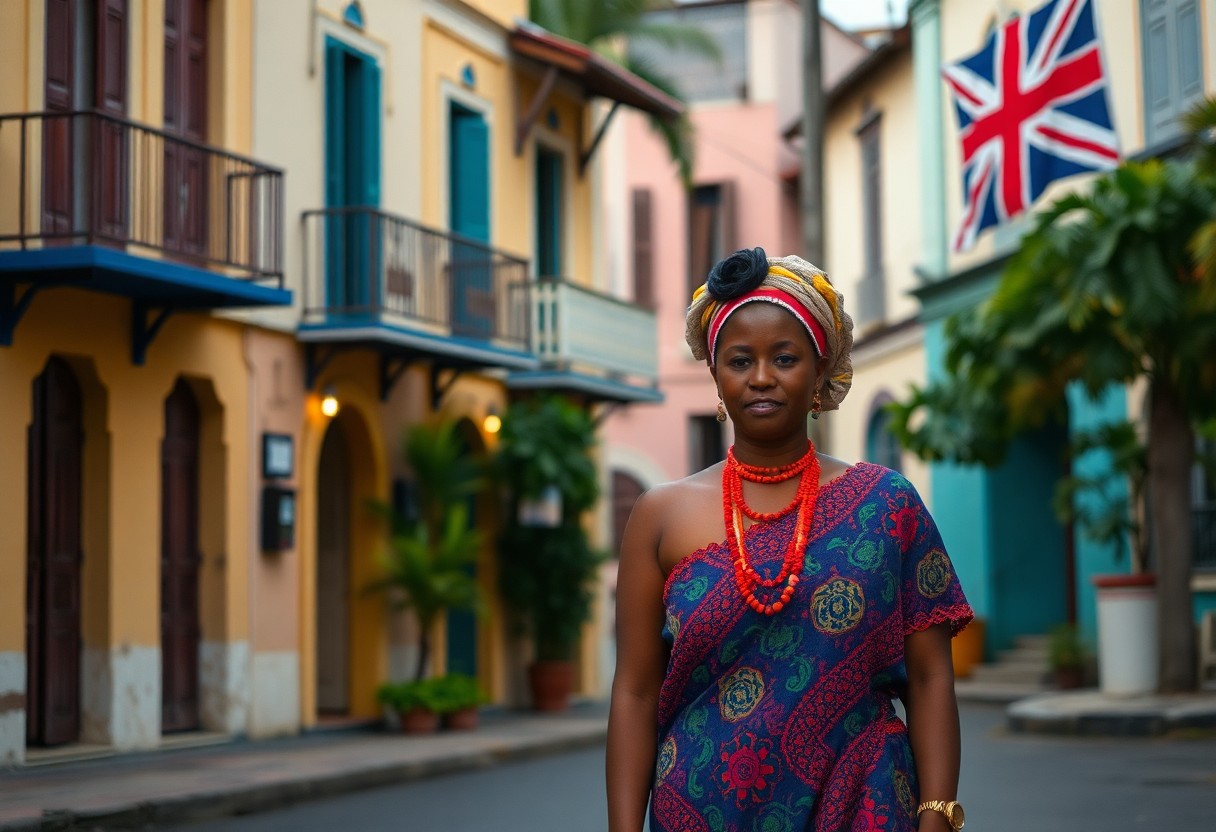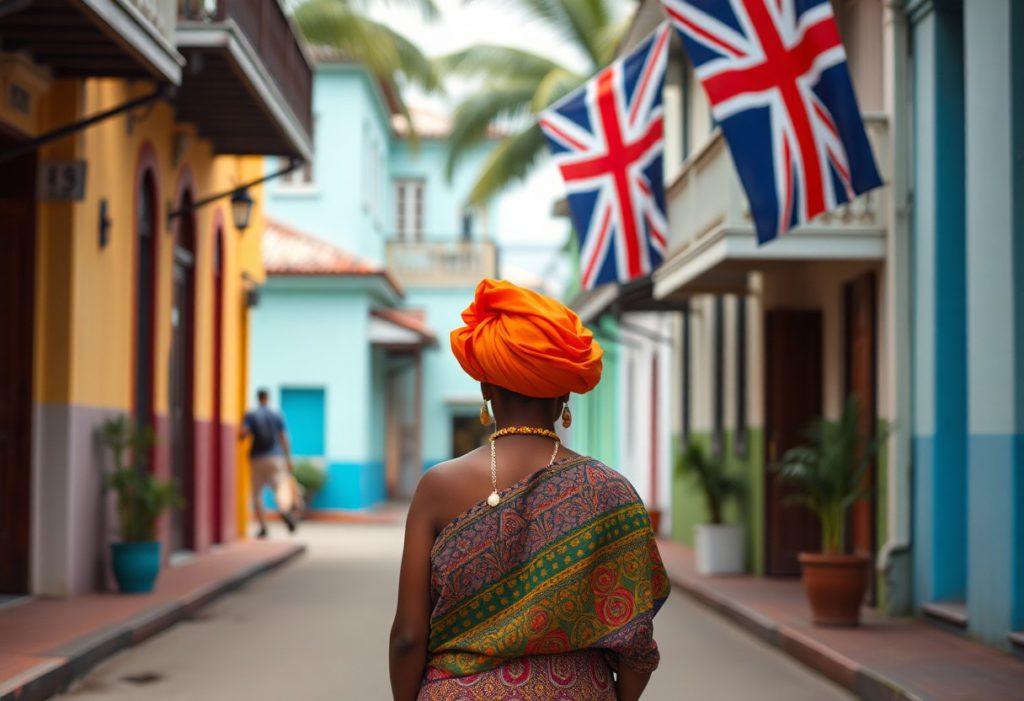Belize holds a prestigious reputation as the only English-speaking nation in Central America, a status that is not just a coincidence but rather the result of a rich and layered history marked by profound British colonial influence. This unique linguistic identity has been meticulously crafted over centuries through the interactions of various cultures. When you delve into Belize’s past, you will discover the pivotal role of British settlers, known as Baymen, who made their mark in the region during the 17th and 18th centuries. Their impactful contributions significantly transformed the local culture and language, further solidified by the transition to British Honduras, which established English as the official language and created a linguistic distinction from its Spanish-speaking neighbors.
Exploring the Historical Foundations of Belize’s Linguistic Identity
The journey of language in Belize is intricately linked to its complex colonial history, which is filled with diverse influences that shaped its identity. The English-speaking culture that defines Belize today is the result of an intricate interplay of British colonialism, interactions with native indigenous communities, and vibrant maritime trade exchanges. As you trace the historical timeline of Belize, you will recognize how British intervention has been instrumental in molding the country’s cultural and linguistic landscape, evolving it from a mere territory into a nation with a well-defined identity that stands out in Central America.
Unpacking the Impact of the British Colonial Era on Language
Beginning in the early 17th century, British settlers initiated a significant transformation within Belize’s linguistic environment. You will observe how British logwood traders and settlers gradually embraced English as the main language for governance and trade activities. Their economic ventures, particularly focused on timber extraction and later agricultural development, integrated the English language into everyday communication, fundamentally reshaping Belize’s linguistic evolution. This linguistic shift was pivotal, laying the foundation for the thriving presence of English in Belize, which has become a defining aspect of its national identity.
Key Historical Events Leading to Belize’s Independence
The historical account leading to Belize’s independence is marked by several crucial decades that highlight significant milestones, from the era of British colonial rule to achieving sovereign nationhood in 1981. Among these milestones, key constitutional advancements, such as the establishment of self-governance in 1964, and the negotiations that culminated in independence, were pivotal. These events represent a strategic evolution in governance that ensured the continual prominence of English as the official language, reinforcing its integral role in the national identity of Belize.
Analyzing Independence and Its Linguistic Consequences
A deeper examination of Belize’s path to independence reveals a multifaceted political evolution. You will gain insight into how peaceful negotiations with the United Kingdom allowed for a smooth transition to self-governance. During this critical period, Belize maintained robust linguistic and administrative ties to British systems, which significantly influenced the ongoing use of English. This understanding emphasizes how Belize adeptly utilized its colonial past to establish a distinct national identity as it progressed toward independence.
The Influence of English in Belize’s Colonial Education System
Investigating the linguistic framework of Belize reveals that British colonial educational policies were pivotal in shaping the dynamics of the nation’s language. The British established English as the primary language of instruction, creating a strategic educational framework that fundamentally altered the cultural communication landscape of Belize. This educational system ensured that English emerged as the dominant medium of learning, effectively transforming the educational experiences of countless generations of Belizeans, thereby intertwining language with cultural identity.
The Establishment of Educational Institutions Under British Governance
In Belize, the foundation of educational institutions was laid under the direct supervision of British colonial authorities, with missionary schools playing a crucial role in disseminating language and cultural values. These early educational establishments were not merely academic venues; they were strategically designed to instill English linguistic norms in students. The British prioritized English language education within these schools, fostering a structured academic environment that gradually reduced the prominence of indigenous languages, thereby reshaping the linguistic landscape of Belize.
Growth of English Literacy Rates and Proficiency
Your exploration will reveal that English literacy rates in Belize witnessed extraordinary growth during the colonial era. By the mid-20th century, approximately 75% of the population had attained functional English language skills, showcasing the effectiveness of the comprehensive educational initiatives implemented by British authorities. This transition represented a significant milestone, not just academically, but also culturally, reshaping the identity of Belizean society in profound ways.
Acquiring English became indispensable for social mobility and economic advancement in Belize. You will come to understand that language acquisition surpassed mere educational goals; it emerged as a gateway to improved opportunities. The British colonial framework effectively linked English proficiency with professional success, motivating Belizeans to master the language. Being proficient in English opened doors to better job prospects, administrative roles, and elevated social standing, making language a crucial mechanism for cultural and economic integration in Belize.
Understanding the Relationship Between Official Language and Local Dialects
As you delve deeper into Belize’s linguistic landscape, you will uncover a complex and multifaceted dynamic. Although English is recognized as the official language, the nation’s communication is enriched by a diverse array of cultural influences. You will find that language in Belize is not merely a binary choice; it embodies a dynamic interplay of historical and social factors that shape communication across various communities, making it a vibrant tapestry.
The Significance of English in Belizean Society
Beyond its official status, English serves as the primary language for government operations, educational institutions, and media. Notably, around 63% of the population speaks English as either their first or second language, highlighting its entrenched importance in Belizean society. This predominance of language is a direct reflection of the nation’s British colonial legacy, and it continues to play a vital role in shaping Belizean national identity in the modern era.
The Unique Development of Belizean Creole
Local Belizean Creole, commonly referred to as Kriol, stands out as a dynamic linguistic hybrid, representing a unique blend of English vocabulary infused with African grammatical structures. Approximately 37% of the population communicates in this language, which serves as a vibrant expression of cultural resilience and identity, transcending traditional colonial linguistic confines.
Research and legal records indicate that Belizean Creole emerged during the slavery era, evolving as a means of communication among enslaved Africans from diverse linguistic backgrounds. You will come to appreciate how this language has transformed into a symbol of cultural survival and resistance, evolving from a simple communicative tool into a proud emblem of Belizean heritage and identity.
Exploring the Linguistically Diverse Minority Languages in Belize
On the fringes of the linguistic spectrum, you will uncover Belize’s impressive variety of languages. Maya languages such as Q’eqchi’ and Mopan, in addition to Spanish and Garifuna, coexist within this multilingual environment, together representing about 25% of the linguistic diversity of the population. This rich linguistic tapestry mirrors the intricate historical and cultural interactions that have shaped Belize’s multifaceted identity.
The linguistic diversity in Belize extends beyond mere communication; it stands as a testament to cultural preservation. You will find that speakers of minority languages actively engage in efforts to maintain their linguistic heritage through community education, cultural celebrations, and intergenerational knowledge transfer. These languages serve not only as tools for communication but also as living repositories of historical and cultural wisdom, ensuring that the stories and traditions of their respective communities are preserved for future generations.
The Contemporary Significance of Language Diversity in Belize
Belize’s linguistic heritage not only reflects its complex colonial history but also deeply influences current social and economic dynamics. You will discover that the multilingual landscape presents unique opportunities and challenges, with English serving as a unifying thread while simultaneously preserving the nation’s rich cultural diversity. This intricate linguistic fabric enables Belizeans to navigate global contexts while honoring their unique national identity, fostering a strong sense of belonging and community.
Innovative Education Systems and Bilingual Programs in Belize
Language is a cornerstone of Belize’s educational framework, where bilingual education is actively promoted. As you explore this aspect, you will find that schools emphasize instruction in both English and Spanish, equipping students with comprehensive communication skills. This dual-language approach ensures that learners can appreciate multiple cultural perspectives, preparing them for a multitude of professional opportunities in an increasingly interconnected global landscape.
Government Communication Practices in English: A Linguistic Overview
Official government communications are predominantly conducted in English, enhancing administrative efficiency. You will observe that official documents, legislative activities, and public announcements are routinely published in English, mirroring the enduring legacy of British administrative practices in Belize.
Understanding Belize’s governmental language practices reveals a nuanced communication strategy. While English remains the central administrative language, there is a growing recognition of the importance of multilingual communication within government institutions. Official translations and multicultural outreach initiatives reflect a commitment to inclusive governance that values the country’s linguistic diversity and promotes unity among its citizens.
The Economic Significance of English in Tourism and Global Engagement
In the aftermath of British colonial influence, English has emerged as a strategic economic asset. You will appreciate how this linguistic advantage attracts international visitors and investors, establishing Belize as an appealing destination for English-speaking tourists and businesses alike.
The presence of multilingualism is reshaping Belize’s economic landscape, creating competitive advantages in global markets. You will see how the ability to communicate effectively in English facilitates international trade, tourism growth, and cross-cultural business interactions. This linguistic adaptability positions Belize as a prime hub for foreign investment and cultural exchanges, further enhancing its economic prospects.
The Enduring Impact of British Influence on Belizean Language
Despite its geographical closeness to Spanish-speaking countries, Belize’s linguistic heritage is a direct consequence of British colonial governance. You will find that the English language became deeply integrated during the long history of British Honduras, establishing a distinctive linguistic landscape that differentiates Belize from its Central American counterparts and shapes its cultural identity.
Creating a Unique Cultural Identity and National Pride
In the period leading up to independence in 1981, Belizeans forged a complex cultural identity that blended British administrative customs with local indigenous and Caribbean influences. This rich multicultural heritage transformed English from a mere colonial remnant into a symbol of national unity and pride, reflecting the diverse cultural tapestry of the nation and its journey toward self-determination.
Maintaining Ties to the British Monarchy
Belize retains a fascinating constitutional relationship with the British Crown, functioning as a Commonwealth realm. You will note that historically, Queen Elizabeth II served as the head of state, with a Governor-General representing her interests in Belize.
The intertwining of cultures continues in Belize’s ongoing relationship with the British monarchy. While the King of the United Kingdom remains the official head of state, day-to-day governance is overseen by elected Belizean officials. This unique setup reflects the enduring diplomatic and historical ties between Belize and the United Kingdom, symbolizing a shared legacy that continues to shape Belizean society.
Understanding Belize’s Political Structure: Governance Framework
In 1981, Belize transitioned to a parliamentary democracy modeled after the British Westminster system. You will find that this political framework guarantees democratic representation while maintaining symbolic links to British governmental traditions that have significantly influenced Belize’s governance since its colonial era.
The cultural legacies of British governance continue to impact Belize’s political landscape. The country operates under a parliamentary democracy, with a Prime Minister serving as the head of government and a monarch fulfilling ceremonial duties as the head of state. This structure reflects the deep-rooted British administrative traditions that have shaped Belize’s governance since colonial times.
Investigating Sociolinguistic Research Conducted in Belize
A plethora of sociolinguistic researchers have examined the intricate language dynamics of Belize, focusing on the interplay of English with Creole, Spanish, and Indigenous languages. You will find that the linguistic landscape serves as a testament to the country’s unique multicultural heritage. Academic studies underscore how language functions as a vital marker of national identity, mapping the complex social interactions that shape communication across diverse communities.
Examining Language Attitudes and Societal Perceptions in Belize
Research on language attitudes in Belize highlights how English operates as a symbol of social mobility. You might be surprised to learn that perceptions surrounding language can significantly impact social opportunities. Linguistic studies indicate that proficiency in English is often associated with educational and professional advancement, cultivating a complex social hierarchy that affects interpersonal relationships and economic prospects for Belizeans.
Documenting the Extraordinary Linguistic Diversity of Belize
Academic research in Belize has meticulously cataloged the remarkable linguistic diversity within the nation. You will discover that scholars have systematically mapped language variations across various regions, capturing the nuanced ways communities communicate and engage. These documentation efforts serve to preserve the rich linguistic tapestry that characterizes Belize’s unique communication patterns and identities.
Given the depth of linguistic inquiry, you’ll find that thorough documentation plays a crucial role in understanding Belize’s language ecosystem. Researchers have undertaken extensive fieldwork to gather data on language usage, document endangered languages, and analyze the intricate interactions between English, Creole, Spanish, and Indigenous languages. Your understanding of Belize’s linguistic landscape will be greatly enriched by these systematic scholarly investigations, revealing how language mirrors historical, social, and cultural transformations.
Examining Language Use in Popular Culture
Your exploration of Belize’s linguistic landscape reveals how English permeates daily life, reflecting the country’s multifaceted historical narrative. The language functions not only as a communication tool but also as a cultural identifier, connecting individuals from diverse ethnic backgrounds and uniting Belizeans through a shared linguistic heritage that is deeply rooted in British colonial history.
Music and Arts as Expressions of Cultural Identity
Through the creative use of English, Belizean artists transform language into a vibrant medium for cultural storytelling. Musical genres such as punta rock and traditional Creole performances exemplify how English intertwines with local rhythms, enabling artists to convey nuanced experiences of identity, struggle, and celebration, thereby enriching Belizean culture and its artistic expressions.
The Influence of Media on Language Perception in Belize
Within the media landscape of Belize lies a robust linguistic ecosystem where English predominates across television, radio, and digital platforms. Local news stations and radio broadcasts primarily communicate in English, reinforcing its status as the principal language and communication channel that resonates with the populace.
Culture plays a transformative role in media’s linguistic influence, with broadcasting networks strategically utilizing English to reach a diverse audience. Approximately 63% of Belizean media output is produced in English, underscoring its significant impact on language perception and the national communication strategies. Your comprehension of this dynamic illustrates how media functions as a vital mechanism for language preservation, ensuring the continuing relevance of English in contemporary Belizean society.

Addressing the Challenges of Language Preservation in Belize
Despite the rich tapestry of linguistic diversity, Belize encounters significant challenges in safeguarding its unique linguistic heritage. You will find that while English retains its status as the official language, the nation’s linguistic landscape is increasingly threatened by gradual language erosion and evolving social dynamics that challenge traditional communication patterns.
Identifying the Challenges Facing Local Languages
At the intersection of globalization and cultural shifts, indigenous languages such as Kriol, Garifuna, and Maya face unprecedented challenges. You can observe how younger generations increasingly prefer English as their primary mode of communication, potentially leading to a dramatic decline in linguistic heritage within just one or two generations, threatening the cultural richness of Belize.
Implementing Effective Strategies for Language Maintenance
Preserving Belize’s linguistic diversity requires comprehensive, multifaceted strategies. You will discover that educational initiatives, community engagement, and cultural documentation are crucial in safeguarding linguistic diversity. Local schools are adopting bilingual curricula to ensure that younger generations stay connected to their linguistic roots and cultural heritage.
Addressing the threats to linguistic diversity necessitates proactive strategies. It is essential to understand that preserving languages involves more than mere academic documentation; it necessitates active community involvement. Collaborative efforts among government bodies, educational institutions, and indigenous communities can foster sustainable language revitalization programs. Moreover, utilizing digital platforms, multimedia resources, and intergenerational knowledge transfer is increasingly vital in preserving Belize’s linguistic richness for future generations.

Conducting Comparative Linguistic Analysis in Belize
To appreciate the complexity of Belize’s linguistic environment, you will encounter a nuanced comparison between its language patterns and regional variations. The following table illustrates key linguistic characteristics:
| Language Characteristic | Belize Specifics |
|---|---|
| Primary Language | English (Official) |
| Secondary Languages | Spanish, Kriol, Garifuna |
Contextualizing English Within the Caribbean Linguistic Framework
A significant aspect of Belize’s linguistic heritage is its connection to Caribbean English variants. You will observe that British colonial influence has profoundly shaped language development, resulting in distinctive communication patterns that are prevalent across former British territories in the Caribbean.
Revealing Belize’s Unique Linguistic Landscape and Heritage
History shows that the evolution of language in Belize stems from complex colonial interactions. You will discover a vibrant multilingual environment where English coexists with indigenous and immigrant languages, reflecting the country’s rich cultural diversity and historical complexity.
This context illustrates that Belize’s linguistic diversity is more than a historical artifact; it represents a compelling narrative of survival, adaptation, and cultural resilience. You will appreciate how English serves as a unifying medium while simultaneously safeguarding unique cultural identities, with approximately 62.9% of the population communicating in English as either a primary or secondary language.

International Influences Shaping Belize’s Linguistic Landscape
International factors have significantly influenced Belize’s linguistic environment and have deeply impacted its cultural and economic development. The British colonial legacy intertwines with ongoing international relations, crafting a unique national identity that transcends traditional boundaries. Your exploration of Belize’s linguistic evolution reveals a complex narrative woven from power dynamics, migration, and cultural exchange that continues to unfold.
The Impact of Globalization on Linguistic Dynamics in Belize
By embracing global communication networks, Belize has emerged as a multilingual hub where English serves as a strategic advantage. Your investigation of linguistic dynamics reveals how international trade, tourism, and educational exchanges have solidified English’s role as a primary communication tool, enabling Belizeans to effectively participate in global conversations and cultural dialogues.
The Influence of Diaspora Communities on Belize’s Linguistic Identity
In any discussion regarding Belize’s linguistic identity, it’s essential to recognize the profound impact of diaspora communities. Migrant networks have consistently reinforced English language practices, establishing transnational connections that sustain cultural and linguistic continuity across borders.
The transformation of Belize’s social fabric is largely attributed to trade networks and migration patterns. Diaspora communities residing in the United States, United Kingdom, and Canada have maintained strong connections to their homeland, facilitating remittances, sharing cultural knowledge, and preserving linguistic traditions. Your understanding of these dynamics highlights how approximately 15% of Belize’s population lives abroad, creating powerful channels of cultural and linguistic exchange that continually reshape national identity and community connections.
Projecting the Future of Language in Belize
It is vital to recognize that Belize’s linguistic landscape continues to evolve, merging historical influences with contemporary dynamics. While English remains the official language, the nation’s multilingual identity promises an exciting and diverse future. You will find that Belize’s commitment to linguistic diversity reflects its rich cultural heritage, with Creole, Spanish, and indigenous languages playing crucial roles in shaping communication patterns and cultural expressions.
Anticipating Linguistic Trends and Future Developments
Amid globalization and local cultural preservation, expect Belize’s language ecosystem to become increasingly intricate. Younger generations are likely to become more multilingual, with heightened proficiency in Spanish and indigenous languages alongside English. The country’s educational policies and economic opportunities will continue to influence these linguistic transformations, potentially creating a more nuanced communication landscape that embraces diversity.
The Importance of Language Policy and Strategic Planning for Belize’s Future
Language policy will be critical in shaping Belize’s linguistic future, with governmental strategies and educational initiatives taking center stage. Protecting linguistic diversity is essential for policymakers who recognize the importance of maintaining cultural identities while promoting effective communication across various communities.
Moreover, comprehensive planning is necessary to strike a balance between preservation and progress. Educational institutions are pivotal in developing multilingual curricula that honor Belize’s diverse linguistic heritage. You will find that strategic language planning can help maintain English as a unifying language while simultaneously fostering the growth and vitality of other languages within the country.
Case Studies Highlighting Language Use Trends in Belize
Belize’s linguistic landscape showcases fascinating patterns of language integration. The following case studies illuminate the complex dynamics of English usage across various societal contexts:
- Urban centers such as Belize City: 98% English proficiency
- Rural Mayan communities: 65% bilingual rates
- Coastal regions: High prevalence of Creole language
- Professional sectors: 85% English-dominant communication
- Educational institutions: Mandatory English instruction
Investigating Linguistic Variations Between Rural and Urban Settings
Before examining linguistic variations, it’s crucial to recognize that rural and urban environments exhibit distinct communication patterns. Rural areas maintain stronger ties to indigenous languages, while urban centers showcase more standardized English usage, creating a nuanced linguistic ecosystem that reflects Belize’s intricate historical heritage and social fabric.
Multilingual Families and Their Impact on Children’s Linguistic Development
Among Belizean families, multilingual transmission is a dynamic cultural phenomenon. Children frequently navigate between English, Spanish, Kriol, and indigenous languages, fostering remarkable linguistic flexibility from an early age.
Further investigation reveals that bilingual families confer significant cognitive advantages to children. Neurological studies indicate that multilingual exposure enhances cognitive processing and nurtures adaptive communication skills that transcend conventional linguistic boundaries. You will find that these children demonstrate improved problem-solving abilities and cultural adaptability, positioning them as unique linguistic ambassadors within an interconnected global landscape.
Notable Contributions of Key Figures in Language Advocacy in Belize
For decades, advocates for language preservation in Belize have played a critical role in maintaining and promoting English as a national communication tool. You will discover that these individuals have been instrumental in shaping the linguistic landscape, ensuring that English remains a unifying force across diverse ethnic groups. Their advocacy has transformed language from a colonial remnant into a powerful instrument of national identity and cultural pride.
The Role of Activists and Linguists in Language Advocacy
Linguistic experts and social activists in Belize have been pivotal in understanding and promoting language dynamics. You will find that their thorough documentation of English’s evolution highlights its significance beyond colonial narratives. Their research illustrates how language preservation contributes to cultural resilience and national unity, making English a powerful symbol of Belizean social cohesion and collective identity.
The Strategic Influence of Government Policymakers
Government officials in Belize have strategically positioned English as the official language, recognizing its potential to facilitate international communication and stimulate economic growth. You will see how their policies have systematically integrated English into education, governance, and public services, ensuring broad linguistic accessibility and opportunities for all citizens.
Linguists and policymakers have collaborated to devise comprehensive language strategies. You will appreciate how they have crafted educational frameworks that protect linguistic diversity while ensuring that English remains the primary medium of instruction. Their approach acknowledges that language policy is more than just a means of communication; it is about national identity formation. By investing in bilingual and multilingual education programs, they have ensured that Belize’s linguistic landscape remains vibrant and inclusive.
Key Insights into Belize’s Linguistic Journey
Belize’s linguistic landscape reflects its intricate colonial history. As you navigate through the country’s past, you will find that British colonial governance had a profound effect on its language and cultural identity. The era of British Honduras established English as the official language, which continues to shape Belize’s national communication today. Your understanding of this historical journey reveals how colonial legacies persist, with English serving as a unifying force among Belize’s diverse ethnic groups. In considering the country’s unique trajectory, you will realize that language is more than just a means of communication—it stands as a testament to Belize’s resilient national spirit and its ability to transform historical challenges into a distinctive cultural narrative that is celebrated today.
Addressing Common Inquiries About Belize’s Language Dynamics
What explains Belize’s primary use of English despite its Central American location?
Belize’s primary use of English stems from its historical context as a British colony, known as British Honduras from 1862 until 1981. The British established administrative and educational systems that entrenched English as the official language, creating a linguistic legacy that continues to influence modern Belizean society.
How did British colonial governance shape language development in Belize?
British colonial authorities mandated English as the language for government, education, and commerce. They enforced educational policies that required English instruction, effectively establishing it as the primary communication medium across both administrative and social domains.
What linguistic diversity exists alongside English in Belize?
While English is the official language, Belize boasts a rich linguistic landscape that includes Kriol (an English-based creole), Spanish, Garifuna, Maya languages, and Mandarin. This multilingual environment reflects the country’s diverse ethnic composition and complex historical interactions, contributing to its vibrant cultural tapestry.
When did Belize gain its independence, and how did this affect its language status?
Belize achieved independence from the United Kingdom on September 21, 1981. Despite gaining political independence, the country retained English as its official language, underscoring the enduring linguistic influence of British colonial governance and the significance of English in Belizean identity.
How does language today reflect Belize’s national identity?
English represents Belize’s historical ties to British colonial heritage while simultaneously embodying its modern capabilities for international communication. The language serves as a unifying element among Belize’s diverse ethnic groups and facilitates global economic and diplomatic interactions, strengthening Belize’s identity on the world stage.
The Article Why Does Belize Speak English? Tracing Its Colonial Roots and Modern Identity appeared first on Belize Travel Guide
The Article Belize’s English: Exploring Colonial Roots and Modern Identity Was Found On https://limitsofstrategy.com
References:
Belize’s English: Exploring Colonial Roots and Modern Identity



The historical journey of Belize’s linguistic identity is indeed fascinating, particularly how it reflects the broader tapestry of colonialism and cultural exchange. It’s intriguing to consider how the presence of the Baymen not only introduced English but also set the stage for a unique blend of cultures that continues to shape Belizean society today.
You’re spot on about the Baymen’s influence. It’s fascinating to think about how they didn’t just bring English, but also a whole way of life that mixed with the diverse communities already here. The blending of cultures, from the indigenous roots to African, Garifuna, and Mestizo influences, creates a rich linguistic stew.